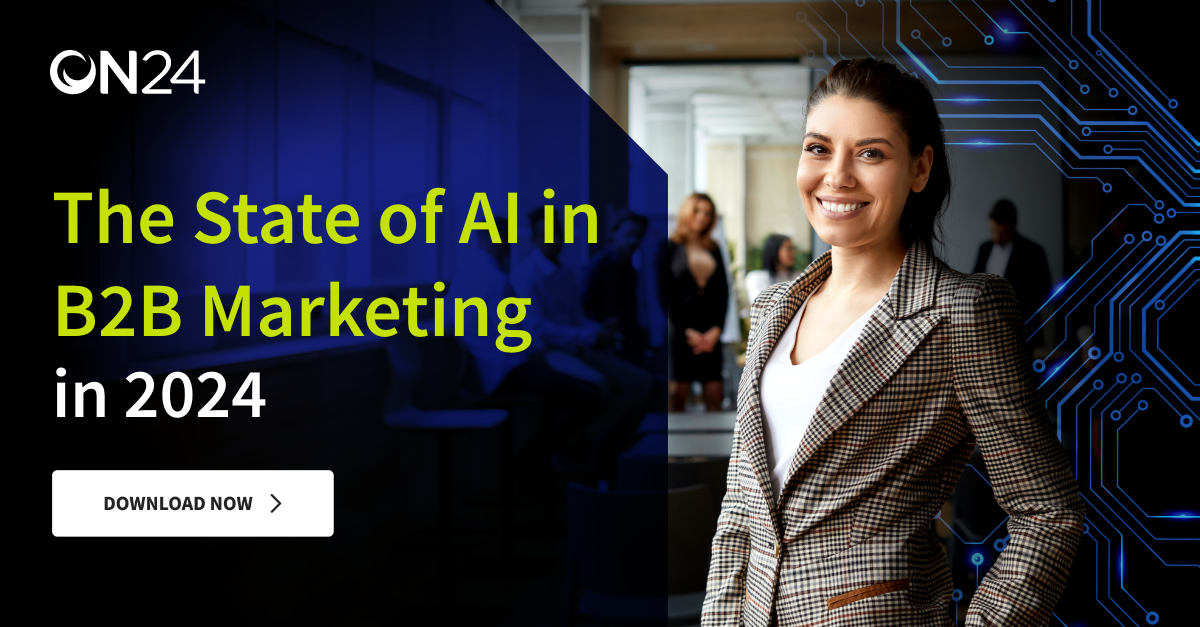Since the introduction of generative AI tools, like ChatGPT, artificial intelligence has been on the tip of nearly every tongue across the marketing landscape. This includes the C-suite, where CEOs are looking for ways to use AI in marketing to drive more efficient B2B marketing initiatives.
In fact, according to research by BCG, roughly 9 in 10 executives rank AI and generative AI within their top three priorities for 2024. Moreover, new data from The State of AI In B2B Marketing 2024 report found that 72% of B2B marketers say their executives are asking how they will use AI.
There’s a good reason why executives are concerned; the B2B buyer’s journey is more complex, with more decision-makers and more information to digest than ever before. AI has the power to help marketers navigate these complexities by automating manual tasks and freeing up time and resources to focus on strategic initiatives. Not to mention, it can provide deep insights into target audiences, enabling more effective marketing campaigns.
The growth of AI is an opportunity for B2B marketers. An opportunity to change how they engage audiences and how they work with the wider organization.
But it all starts with knowing how and why to work with AI — not simply using AI. Read on to learn more.
Before anything, know what you need and why you need it

Before adopting any AI tool, it’s crucial to clearly define your goals and understand how AI can help you achieve them. These goals will help guide you to the AI tools and processes that align with your objectives and can be effectively integrated into your operations.
Here are three questions to ask as you explore how AI fits into your marketing:
What goals do you have for AI in your B2B marketing efforts?
Begin by outlining your specific goals. Are you looking to improve operational efficiency, enhance your demand generation efforts, drive sales or gain deeper insights from data?
While clear goals will guide your AI strategy and help you measure success, you also need to ensure these align with your organization’s broader business objectives.
Now is the ideal moment to shift your focus away from quantity (i.e., high attendance or the number of leads) and hone in on quality. Refocusing goals is only the first step in changing the way you engage.
What processes do you already have in place?
Understanding your existing workflows and systems is essential to determine how AI can enhance or automate tasks, leading to greater efficiency and effectiveness.
Where can AI scale existing processes?
Identify specific processes that could benefit from AI implementation. Would your webinar program benefit from better segmentation and personalization? Could your content creation use a boost? These are just a few areas where AI can help.
Of course, marketers don’t work in a silo — collaboration is essential. Gather input from various teams and departments. Be prepared with questions to guide discussions and work through them together to ensure a comprehensive understanding of needs and priorities that reflect the organization’s collective goals.
This collaborative approach ensures that AI initiatives are well-supported and aligned with broader business objectives, leading to more successful outcomes.
Define your short and long-term goals for AI

It’s sometimes helpful to frame goals from a short vs long-term perspective. This mental framework can be particularly useful as B2B marketers figure out how, exactly, to fit AI into processes.
AI tools can be used to overcome short-term challenges, such as lead generation, content creation and data management. AI-powered tools can help automate lead scoring and personalize outreach to improve conversion rates. They can also help with data management by streamlining data processing, cleansing, and integration, providing accurate and actionable insights without the manual workload.
Creating engaging and relevant content consistently can be taxing. However, generative AI can reduce the time and energy spent on creating content. In fact, The State of AI In B2B Marketing 2024 report shows that B2B marketers already use AI to develop promotional content, such as landing pages and email copy (63%) and for longer-from content development like e-books and blogs (49%).
Implementing AI tools to address short-term challenges can provide quick wins and operational relief, allowing marketers time to tackle foundational issues.
When asked to identify their biggest challenges today, the B2B marketers surveyed cited several foundational issues, such as poorly integrated marketing technology, a lack of budget or resources, the absence of an effective marketing strategy and decisions made based on guesswork.
Unfortunately, these foundational issues risk severely limiting the full potential of AI. For instance, poor integration between different platforms means data silos form and the flow of information across departments is hindered, undermining efforts in personalized marketing and sales enablement.
Further to that point, high-quality data is the backbone of effective AI. Inconsistent, incomplete, or inaccurate data can lead to poor AI performance and misguided decision-making.
This is why marketers should consider correcting foundational issues with solutions or platforms that leverage AI and integrate it throughout their organization’s tech stack. Use AI excitement and budget to address these issues that may not have been prioritized previously. Highlight the long-term benefits of AI, such as increased efficiency, better customer insights and competitive advantage, to garner stakeholder support.
Review your AI options

B2B marketers have access to a wealth of AI tools. And while solutions like ChatGPT, Copilot, Adobe’s Firefly and Midjourney offer most everyone the ability to generate text, enhance design tasks or generate visual content, marketers are best served to explore more robust AI solutions if they want the best advantage in enhancing their processes and changing the way they engage with customers and prospects.
A solution like AI-powered ACE by ON24 that is already integrated into the ON24 Intelligent Engagement Platform provides B2B marketers with the tools to make the most of the average 53 minutes of content generated during a virtual event or webinar — whether it be using generative AI to produce follow-up blog posts or to grab key moment videos to be shared in your content hub or via email.

